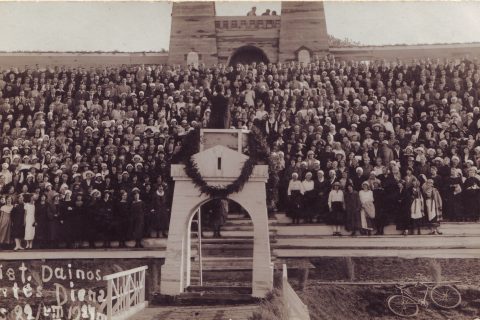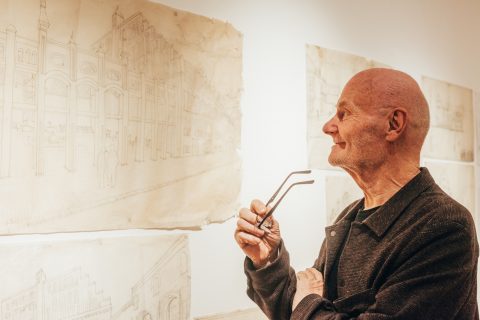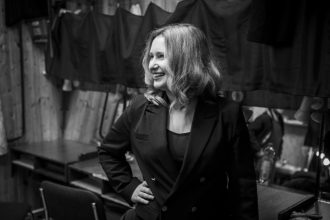Love does not choose time or place. It does not promise long and happy years of life, it does not promise peace or easy choices. “It bears all things, believes all things, hopes all things, endures all things. Love never fails.” (The First Letter of St. Paul to the Corinthians.)
Looking at the Greats of Lithuanian music history, next to many of them, we see their better halves – women who create shelter for the artist with their devotion and care. From the letters, documents, and life stories that have survived, it is possible to follow how their relationships developed and what burden of life they shared.
Stase Petrauskaitė and Juozas Gruodis
“Fire-colored poppies are flaming and flaming! Don’t you recall the trip through Bulgaria, where there were many, many poppies along the way? And now they will remind me of your romance,” Stasė Petrauskaitė wrote from Kaunas to Leipzig to Juozas Gruodis (1884 – 1948) in 1922. The romance mentioned in the postcard is one of the three songs (“Rugiagėlės”, “Aguonėlės”, “Rūta”) based on Kazys Binkis’ poems, composed by J. Gruodis when he studied at the Leipzig Conservatory. In another card congratulating him on his name day, Stasė wrote, “I really like that card, so I kept it in order to send it to you.”
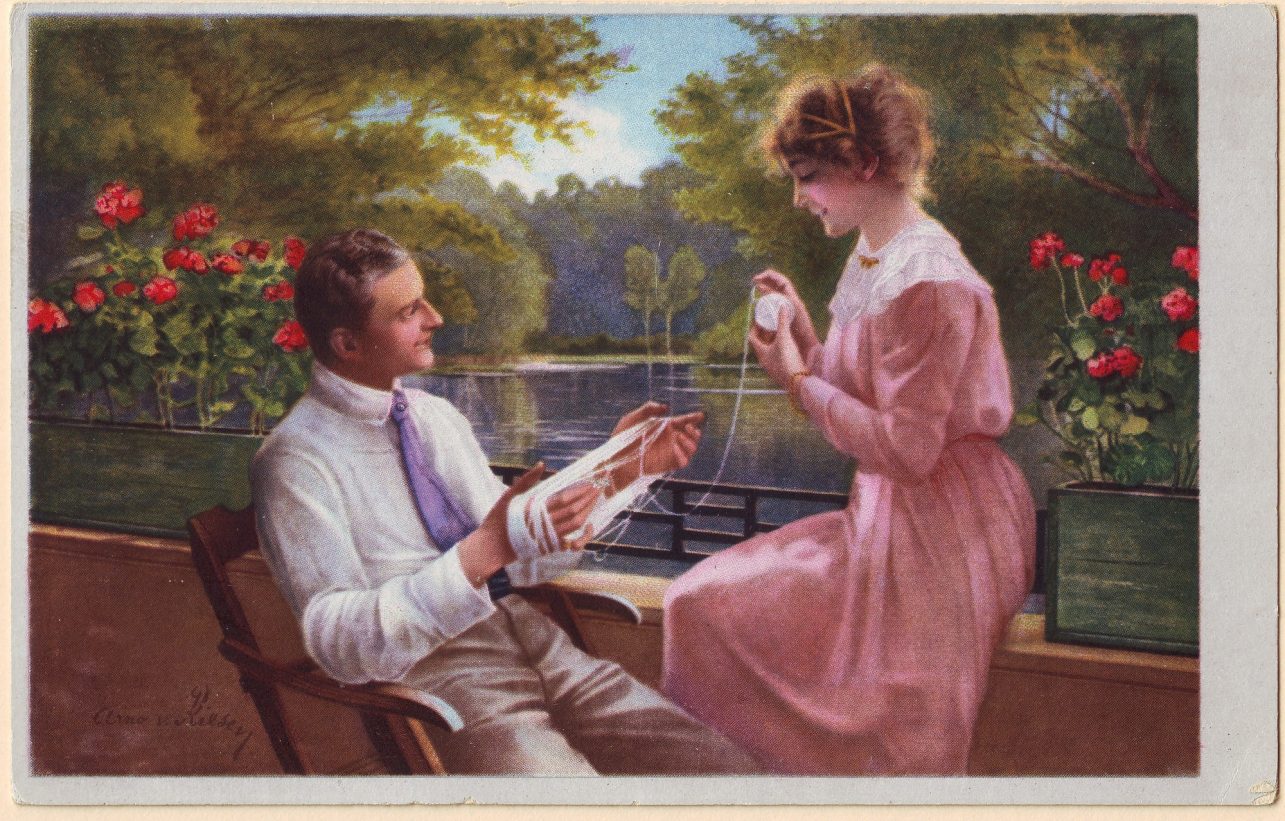
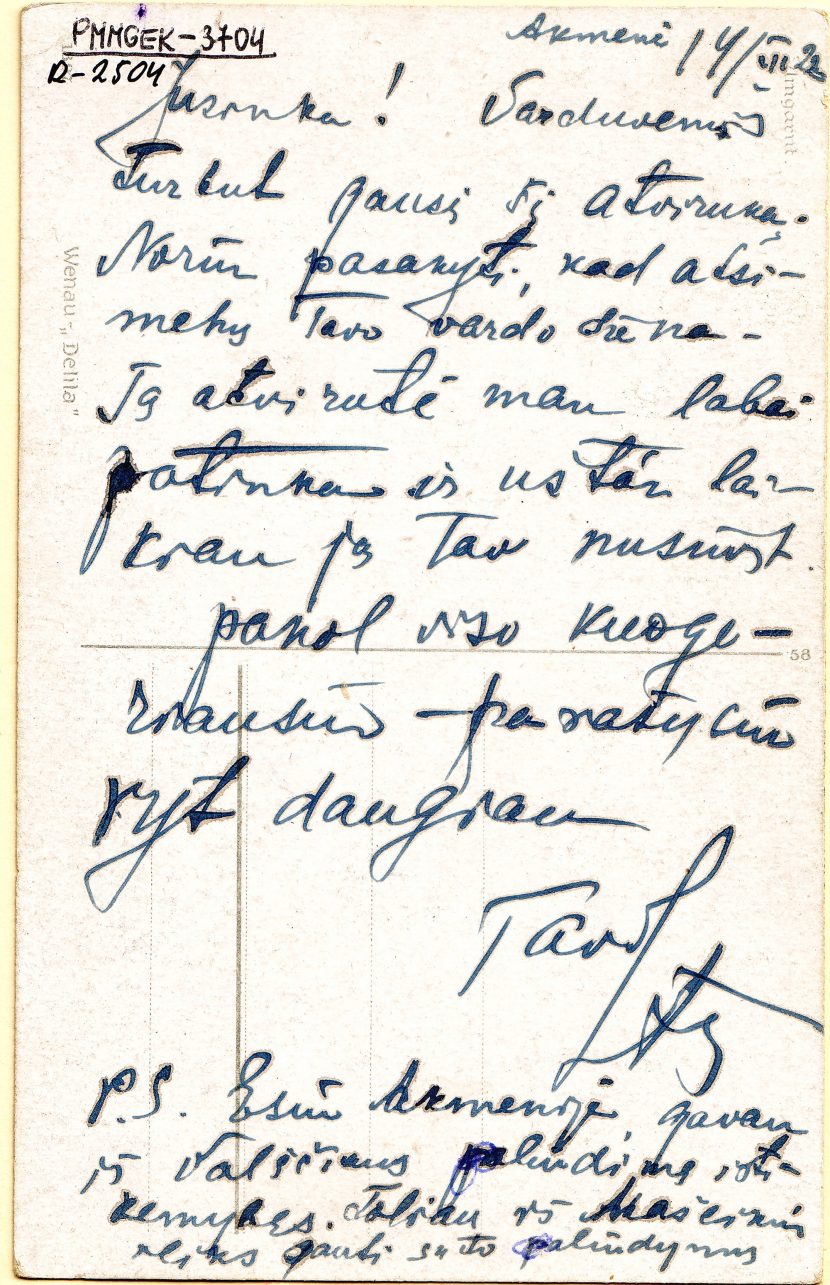
The acquaintance of the two was almost a holiday romance in the seaside resort of Yalta, where since the end of the 19th century many Lithuanians lived and studied. Stasė Petrauskaitė received treatment in the Lithuanian sanatorium and later stayed there to work. J. Gruodis also came there for treatment. Soon after that, J. Gruodis was mobilized, and S. Petrauskaitė urged by her relatives married her fiancé, officer Mykolas Mataitis.
As fate would have it, they met again in Yalta. After falling ill again, Stasė came back for treatment and work there. Juozas also returned for treatment, and he kept visiting her so he could compose at the rented piano. And after all, it all started with J. Gruodis’ audacious act: when asked to convey the greetings of a friend he met in Moscow, he publicly declared during a public dinner, “I must kiss you!” S. Petrauskaitė was granted divorce upon her return to Lithuania. She and Juozas Gruodis were married by Evangelical Lutheran pastor Jonas Šepetys in 1924.
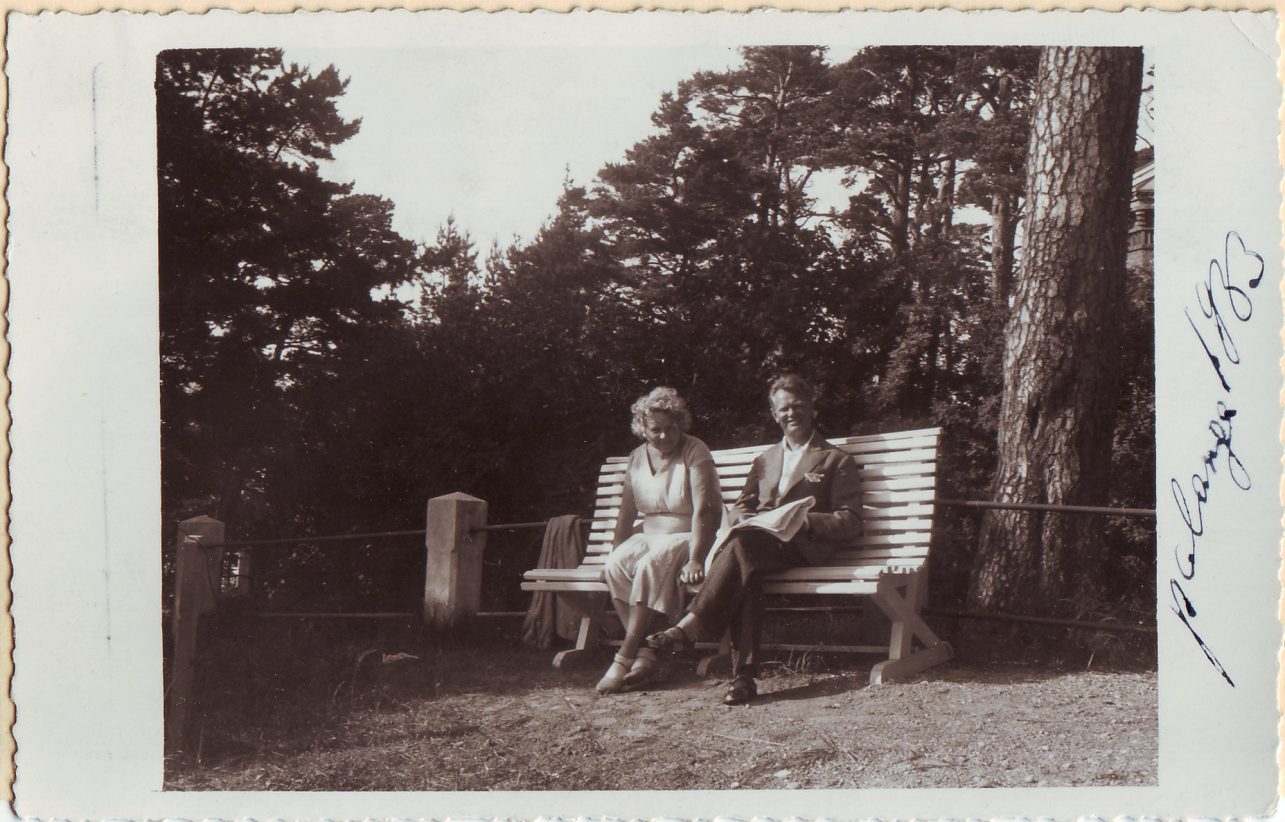
Stasys Šimkus and Sofija Vilkaitė
Composer and conductor Stasys Šimkus (1887–1943)(All letters are published in the book Stasys Šimkus. Laiškai žmonai. Sudarė D. Palionytė. Lietuvos kompozitorių sąjunga, 1997. The original letters are kept in the collection of M. and K. Petrauskas of the Kaunas City Museum.) wrote to Sofija Vilkaitė from Germany, the USA, Austria, Italy, France, and Klaipėda. He used to address her as “My beloved Ziulyte”, “Dear, Zuliute”, “My Zuliuka”, “Ziulyte, my soul”, “My heart”, and signed “Your loving Stasys”, “Yours”, “Your restless Stasys.” In his letters, S. Šimkus described many things: creative ideas, works, concerts, and at the same time domestic questions. For example, in his letters from Germany (1921–1922) he worries about her health (“I hope the ugly consumption will not get you … please, take care of yourself, don’t get cold, sleep longer.”), praises her personality (“You shine like the brightest flower in the wreath of my memories, calming me, refreshing me”; “Only Your kindness, depth, chastity, and calmness will maybe fill that hole so that I don’t sink”), misses her (“My desire is to return to you soon and stay with you inseparably always”), and at the same time naturally discusses domestic matters that were completely entrusted to the beloved Sofia.
In the letters from the US (1927–1928) love and longing (“How happy I would feel if you were with me! Even though everyone loves me here, I still feel like a branch torn from a tree”; “I will never be separated from you for such a long time – it is a real torture!”) are often overshadowed by domestic matters (“It’s really hot here! So, I am sitting in my underwear and writing to you”; “Lithuanian dentists decided to repair my teeth … dentist Juozaitis didn’t take anything from me, he just kissed me and washed it with good whiskey and kept the old steel teeth as a keepsake”; “My debts are as follows: 3,000 litas to the National Bank and 1,000 litas to the Ūkio bank. Do something with the latter, and I will deal with things in Klaipėda myself”; “How big are the cauliflowers? Did you buy a cow? How many chickens are there? Add it next to your loving words and send to me”; “Today I sent you a gift for Christmas. Share as you see fit. Note: rubber raincoat and a cap are for Algis, a scarf, a rosary, and a bead necklace are for Marutė. I will send 100 litas for mother as well as a scarf and a rosary. The airplane is for Nerius, the Zeppelin is for Ramojus. Each man gets a hat. Students will get a bag each and for you, the lady of the house, an apron and other things.”).
The letters from Austria (1930) radiate practical matters (“What kind of cow did you get? How much milk do you have now?”; “You should sell the black one and make me 50-60 dollars”), and from Milan (1930) and Paris (1931) next to the unconcealed way of life (“I received your 300 lire and today I am going out and I will have a drink to your health”) he points out how his wife should feel (“You shouldn’t worry about anything, love me, as you did in the young days; forget and forgive all my wrongdoings”; “Please, adapt to my character, after all, I am an artist – a composer, giddy creature – I am not You!!!”).
Kipras Petrauskas and Elena Žalinkevičaitė
Singer and pedagogue Kipras Petrauskas (1885 – 1968), who brought back a considerable bundle of fan letters from St. Petersburg, wrote to his (future) wife Elena Žalinkevičaitė (1900 – 1986) from his internships in Milan and tours in South America a lot, too. In his warm, sensual letters, he usually addressed her as “My dear Liolė” and ended them with “I am waiting for you, I long for you, and I love you”, and “Kisses” and would sign them with “Yours, Kipras”.
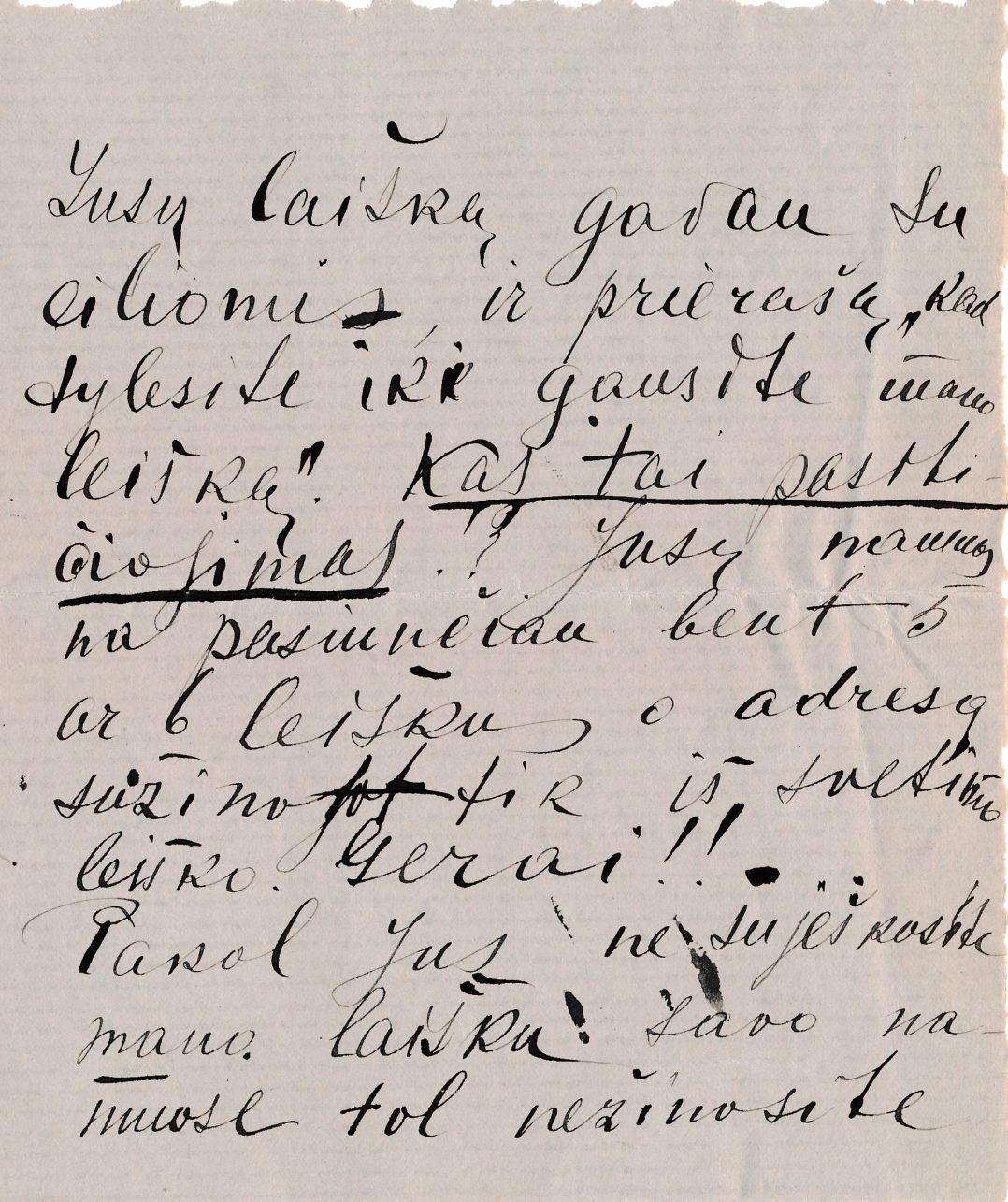
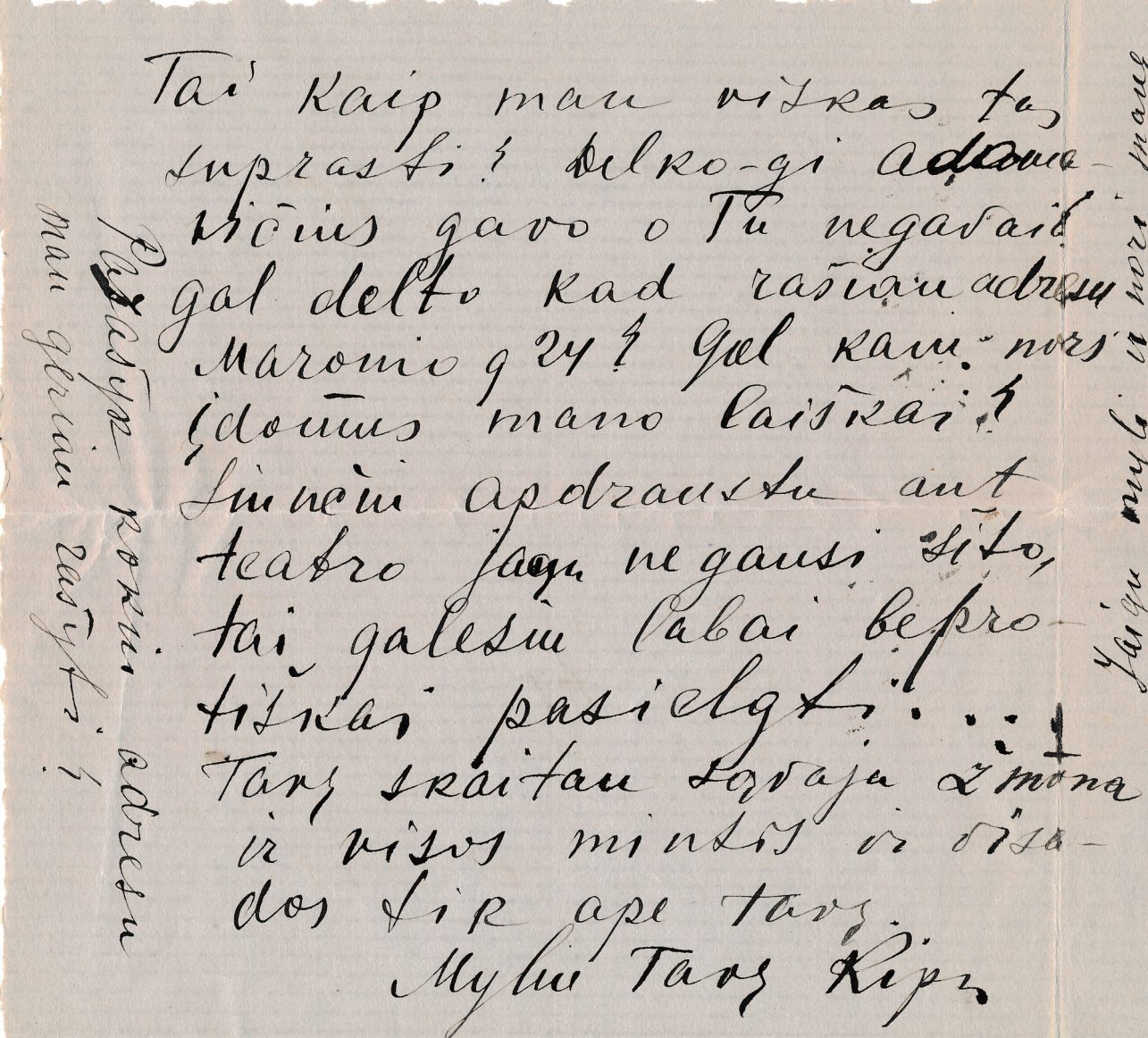
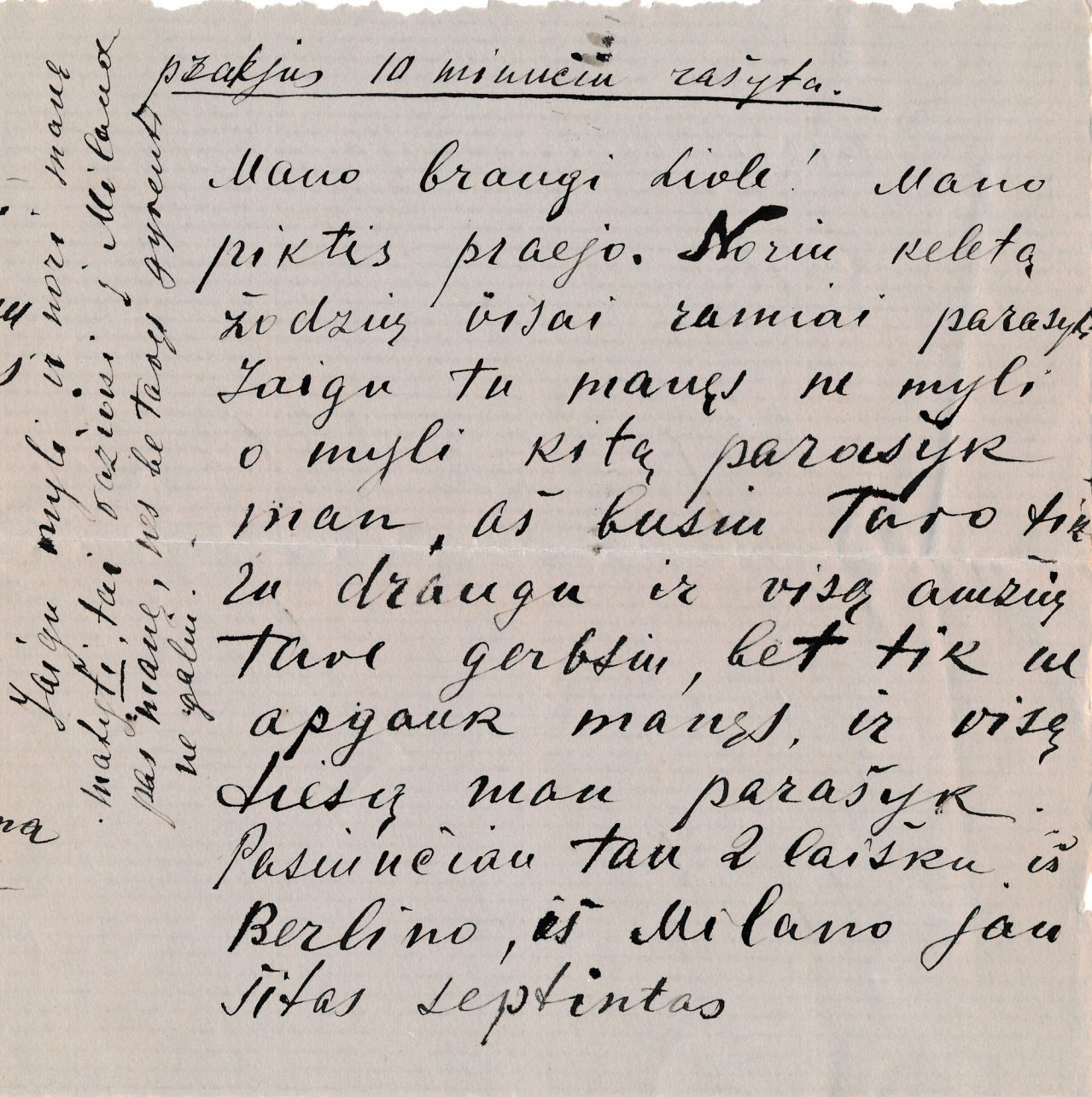
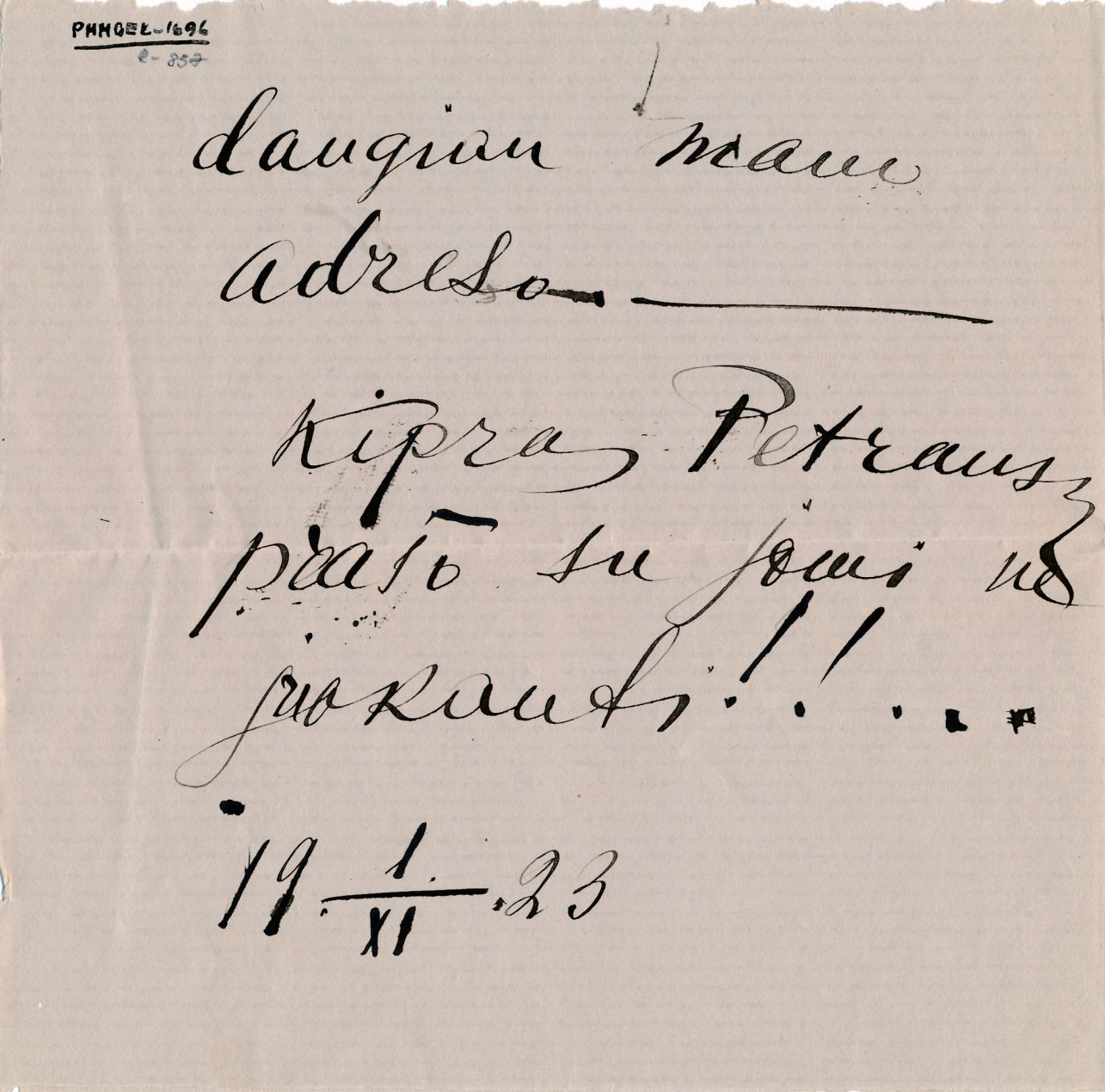
In 1923, when writing from Milan to his future wife (“I consider you my wife and all my thoughts and feelings are only about you”), K. Petrauskas did not hide his emotions (“Oh you serpent, why don’t you answer my letters that I sent you from Milan?”), was happy about her letters (“I received your insured letter today and I cried like a baby, I cried from joy and sadness, I was happy that you love me, that you are my friend in happiness and in sorrow; I cried that our Motherland Lithuania continues to suffer.”), praised her poetry and passed on the praises of others (“Of all the compliments you received for your poems, I liked this one: “If a woman has such pure thoughts, she really loves. There are very few such women in the world, and even more so in Lithuania.” My dear Liolė, I believe in your talent, I believe that you will do a lot for Lithuania and that I will be really proud of you, I believe in you with all my soul!!!”), and then right next to that he quite calmly discussed financial matters (“Old age is peaceful only when it is financially secure. My whole aim and concern are to make as much money as possible”; “Never in my life have I been so economical, never have I lived so carefully.”).
From a tour of South America in 1929, gentle letters full of care and longing flowed to his wife Elena (“I am very troubled by the thought of your health, has something happened to you? I believe in luck, I believe I was born under a lucky star, I have never (I hope) done anything bad to anyone, and God shouldn’t punish you with misfortune because of me”; “Here … we have an opportunity to buy a leopard fur quite inexpensively, so I want to bring it to you as a gift, maybe you will use it for something, perhaps you will make a manteau or something else out of it”; “It appears that I cannot live without you, my dear, and without Lithuania – longing and boredom are eating away at me”; “My beloved, dear Liolytė, how lonely I am without you and being in such a faraway land where climate changes like socks”; “I beg You, my dear, do not be angry, I love You with all my soul, there isn’t a moment that I do not dream of you, there isn’t a second that your face, so dear to me, would not be there in my imagination. … I bought the leopard skin, five skins of some other animal, two monkey skins and six snakeskins, which I will bring to you as a present and that I’ve now given to be treated,”). In his letters, he constantly informs about the money sent home and ends them with words of love and assurances of how important her love is to him, and how much it motivates him to work.
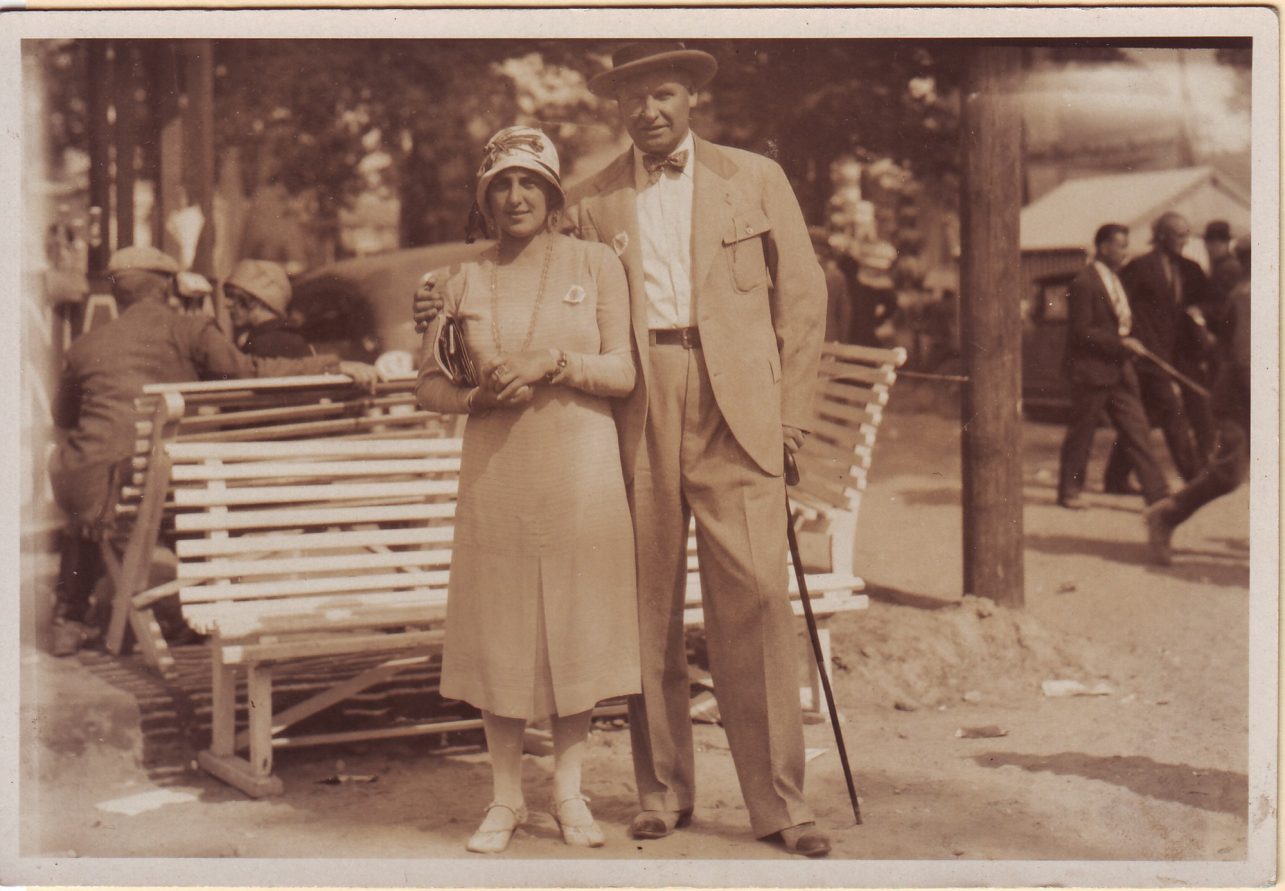
Mikas Petrauskas, Stasė Kuraitytė and Ona Aranauskaitė
Composer, choir conductor, singer, and pedagogue Mikas Petrauskas (1873 – 1937) had two children from two marriages. He had a son Adakris with his first wife Stasė Kuraitytė and a daughter named Protelė with a second wife Ona Aranauskaitė.
Having married for the first time in his youth, and the second time in his old age, he regretted that he did not have the opportunity to raise his children. “The system, and living conditions prevented me from raising my son, and my health will not allow me to raise my daughter. Apparently, I’m not destined to be happy and raise my children, so I just want one thing – for them to become good people,”(From the memoirs of Ona Petrauskienė, published in the book Mikas Petrauskas. Straipsniai. Laiškai. Amžininkų atsiminimai. Sudarė Jūratė Burokaitė, 1976, p. 250.) M. Petrauskas lamented to his wife while holding little Protelė in his arms. Unfortunately, we cannot look at the composer’s letters, but in his notebooks, where he jotted down his thoughts, rewrote poetry, and pasted interesting newspaper clippings, we find various quotes about love. Here are some of them: “True love and happiness are like ghosts: everyone talks about them, but few have seen them”; “Love is the heavenly drop that the gods poured into the cup of life to reduce its bitterness. Rochester”; “To love the spring of life and marry in old age is the same as enjoying the chirping of birds early in the morning and eating it fried in the evening. I. Polis.”
Jeronimas Kačinskas and Elena Šlevaitė
We do not have the opportunity to read the letters of the composer, conductor, and pedagogue Jeronimas Kačinskas (1907 – 2005) to his wife but love and respect can be seen in the memoirs written in exile.(The memoirs Atgal pažvelgus were published in the book Jeronimas Kačinskas. Gyvenimas ir muzikinė veikla. Sudarė ir tekstus parengė Danutė Petrauskaitė. Baltos lankos, 1997.)
They got acquainted in Klaipėda, where E. Šlevaitė, who came from a family of railway workers, sang in the Vaidilutė choir and then, judging by the memoirs of J. Kačinskas, they met only a few times. Apparently, during the war and political change, there was no time for romance, the decision was quick and correct. Here’s how he remembers his marriage in 1941: “My future wife, to whom I was already engaged, anxiously awaited my return from Estonia. When I knocked on her door, I saw Elenutė’s happy face. We decided to get married immediately because life circumstances were changing quickly. The wedding ceremony was initiated by priest Kristupas Čibiras – who was later killed during the Russian bombardment – at the old St. Nicholas Church on July 5. The first hastily prepared banquet took place in Elena’s sister’s apartment, near the railway station. The others were held in Jonava at the wife’s parents’ house. The whole family gathered there, including Elenutė’s brother and his wife from Kaunas. Despite the mass arrests, we were in a cheerful mood. How can you be sad during a wedding feast?”
Acquaintances described their couple as inseparable, where Jeronimas is quiet, thoughtful, and deeply religious, and Elena is lively, practical, and kind-hearted. In his memoirs, J. Kačinskas always wrote “my Elena” about his wife: “Although those were dangerous times, war was raging in the West, Hitler’s machine crushed France and restless rumors spread day by day, my wife and I lived happily. My Elena loved good music”; “My Elena, in all dangers, never parted with me”; “In all dangers, she never left me, on the contrary, she gained great courage, never flustered and wanted to go through the worst hours of the war together.”
Antanas Kučingis and Magdalena Ambrasaitė
The M. and K. Petrauskas collection of the Kaunas City Museum stores the letters of the singer, and military topographer, Major Antanas Kučingis (1899 – 1983).(A. Kučingis’ letters were published in the book Antanas Kučingis. Dokumentai. Atsiminimai. Parengė K. Mikuličiūtė-Vaitkūnienė. M. ir K. Petrauskų lietuvių muzikos muziejus, 2012.)
Both during the period of the First Republic of Lithuania, as well as in exile and after returning to Lithuania, the letters he wrote were full of love, care, gratitude, and faith. The prominent soloist of the State Theater and officer, after the Soviet occupation of Lithuania in 1948, was arrested and imprisoned in the camps of Mordovia, Kemerov, and Omsk regions; almost all of his relatives suffered as well.
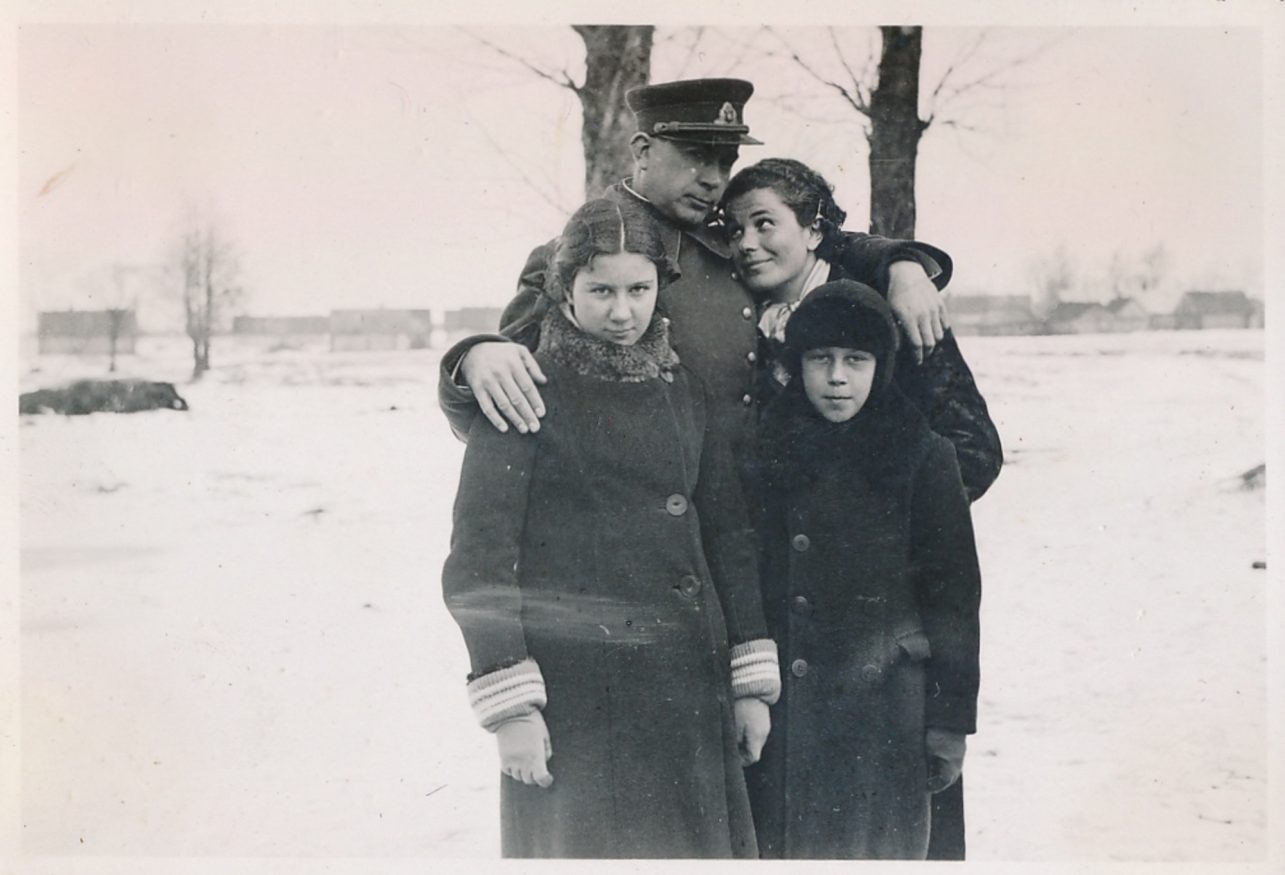
In the letters written to his future wife Marija Magdalena Ambrasaitė, he addressed her as “Magdutė”, “Dear Magdutė”, “My Flower”, and “Dutė.” In the letters written in his youth, A. Kučingis describes his feelings, the joy that nature gives him, and the impressions from his service. Letters from exile are completely different – full of painful longing, concern, and hope. He wrote from the Kemerovo region in 1951: “My dear, take care of yourself because you are my and everybody else’s comfort and strength. … I would be the happiest if I could walk the rest of my life with you, my beloved, in freedom, in our homeland. … Those thousands of kilometers that separate us are nothing, because all my thoughts, prayers, dreams, and desires both day and night are with you, my darling, until my last breath. I kiss your golden hands and thank you from the bottom of my heart for everything.” While reading through A. Kučingis letters, you are filled with grief seeing the increasing tenderness and how he addresses his wife: “Birdie, my darling”, “My little white swan”, “My dearest.”
Edwin Geist and Lyda Bagranskytė
German composer and musicologist Edwin Geist (1902 – 1942) wrote not letters but a diary to his wife imprisoned in the ghetto from 1942 Palm Sunday until August 31. Unable to work in Germany due to his unsuitable origins for the Nazis, E. Geist, and his wife, pianist Lyda Bagranskyte (1911 – 1942) from Prienai lived in Kaunas from 1938 to 1942. Here, in the Pribatis bookstore in 1940, he published a book Antikes und Modernes im Litauishen Volkslied with a dedication that read “For my wife.” L. Geistienė was put in the ghetto in 1941. After trying all the possibilities of freeing his wife, but not agreeing to the required sterilisation of her, he was shot. After learning this, Lyda poisoned herself. But earlier, on August 1, a hopeful E. Geist wrote: “Let’s draw a curtain on this picture, it seems that no more writing will be necessary. And when you read the lines of your diary, remember that during our separation and trials, the only pleasant hours during the sleepless nights were those that I spent at these pages.”( The diary and the composer’s manuscripts were saved by violinist Vladas Varčikas. The diary was published in Edwin Geist’s book Lydai. Dienoraštis 1942. Baltos lankos, 2003.)
Today, these letters, memories, and thoughts may appear too sentimental or intentionally poeticised. But even in hindsight, and perhaps right now, we can learn from them to cherish and be grateful for the time we have been given.

